Fishing the Kisaralik, Part 2
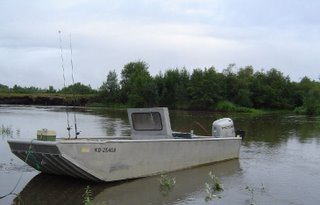 ...continued from Part 1...
...continued from Part 1...Henry took Dad and Uncle Bob in his boat and they headed upriver to find some good fishing holes. Dutch and I stayed in camp for the morning to get the kitchen tent organized, set up the latrine arrangement, and search the nearby willows and cottonwoods for any burnable wood for the campfire. Everything was sodden from the all-night downpour, and we found nothing promising. But at least the rain was tapering off to occasional misting showers and large patches of blue sky held the promise of drier times to come.
By midday the fishing contingent was back, and the big smiles on their faces told us they had had some success. Uncle Bob bounded from the boat gleefully and couldn’t wait to show us the six bright silver salmon they had landed.
“Fresh salmon for dinner tonight!” he crowed.
They were beautiful fish, each one about ten to twelve pounds. He and Dad filleted them expertly and put them on ice in the fish cooler while I made sandwiches for lunch and Dutch brewed a fresh pot of coffee.
After a leisurely lunch break, the brothers were ready to try again, so I took them upriver in my boat while Dutch and Henry took his boat downriver for a logging expedition. Henry had his eye on some dead standing fir we had passed the day before which should be dry enough to burn, as well as a small birch grove which should yield some fine tent poles. Bear went with them, and Pepper stayed with us.
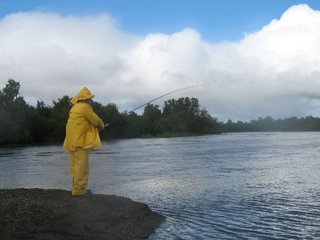
The spot where they had had success in the morning was quite enticing, a long finger of gravel bar that protruded into the river at a bend creating a large eddy between it and the river bank. Dad headed to the upriver end of it to try his fly rod in the shallower end of the eddy, and Uncle and I casted from the tip of the finger across the mouth of the eddy. With the brighter sun and warming temperature, the fish were not as active. Dad brought back a nice silver caught on an egg pattern fly with a purple flash, and Uncle Bob caught a small pike and a silver.
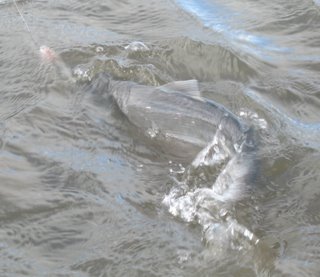
“Let’s try a new spot,” Dad said, so we headed further up.
As we rounded a bend in the river, we saw a small rubber raft floating down with two people in it, a man and a woman. It had a single set of oars, and the woman was rowing. There was a large mound of gear behind her held to the raft with a bungee net. We slowed down until we were creating no wake behind the boat, so as not to bounce them around and waved as we passed. The grim look on their faces told us that they had probably had a worse night in the storm than we did.
We spent another hour and tried a few more fishing spots upriver, but had no further luck, so we headed back to camp. Henry and Dutch had arrived just ahead of us and had done well with their logging effort. They dropped two good-sized dead standing fir trees and bucked them up into two foot lengths. The bark was wet, but the interiors were dry, and Dutch split them into firewood with an axe. They had also found good, straight birch saplings to make support poles for our wall tent.
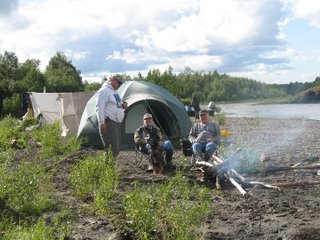
Uncle Bob and Dad got a nice campfire going while Dutch and Henry pitched the third tent, and soon we were all relaxing around the fire swapping stories of the day and telling tales of other adventures. Dad has a lifetime of fishing stories to tell, and he is a great storyteller. He and Uncle Bob play off each other so well, they are nearly like a standup comedy pair, and they had us laughing into the evening.
Henry brought along his heavy-duty folding grate to set up over the fire for cooking salmon, and he took over that part of dinner. I made couscous and cole slaw to go with it, and we feasted ourselves on the finest, freshest salmon available, seasoned with wood smoke from the fire and a little garlic salt and lemon pepper. Dogs were quite happy with salmon skin left-overs.
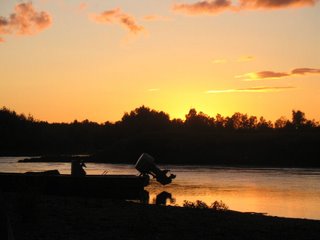
It was a delightful evening of good food and camaraderie, big laughs and tall tales. The sky was clear, except for a few clouds on the horizon; after a slow sunset, twilight seemed to go on forever, with more and more stars popping out as the light faded. Uncle Bob remarked several times at how different the evening light was from what he is used to in Alabama, where twilight doesn’t linger long. Dutch laughed and told him to come back in mid June, when twilight is all the darkness he will get, and not a whole lot of that.
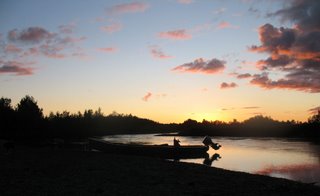
Weather continued to hold for us, and Saturday was part clouds/part sun with only a few light rain showers that passed quickly. The luxury of a plentiful supply of firewood allowed us to enjoy our morning coffee around a campfire that warmed the early chill. The brothers took over bacon cooking in my big iron skillet on the fire grill while I made a batch of scrambled eggs with onions and mushrooms on the Coleman stove. There was no rush to the morning; if we did not catch another fish the entire trip it would not matter. Experiencing the river and being on “river time” was far more important.
There is something so nostalgic about the smell of bacon cooking in the outdoors, and this was no exception. After all the rain, the air was clean and sweet. The dampness of the woods around us added a pungent, earthy scent, and the fast-moving river next to us had the very mildest whiff of fish which was not at all unpleasant. Even though summer is waning now, there is still a turbulent growth of grasses and wildflowers which added another layer of “green” smell. I could stand with my eyes closed and inhale the wilderness and the delightful smell of sizzling bacon wafting through it, hear the river rippling past, feel the warmth of my dog leaning against my leg. Dutch walked up behind me and quietly put his arms around me, and I knew in that moment what heaven was for me.
After breakfast and clean-up, Henry wanted to go exploring upriver. He has been through this area in the winter with his dog team, but not in the summer in a boat. He wanted to see how much farther up he could get, and Dad and Uncle were happy to go along to fish any likely spots he might find. Dutch and I decided to stay in camp and explore the open tundra across the river from our camp for blueberries. I was hoping to find enough to make a blueberry cobbler for dinner.
We had been cautioned before leaving Bethel that there was a good chance we might encounter black bears this far up the Kisaralik, so we were prepared with weaponry. Henry had his 30-30 rifle with him. I had my 30-06, and Dutch had his favorite hand gun, a Beretta. We are all three pretty decent shots, and Dutch is rated “expert” in several weapons from his military training. We were literally loaded for bear, and each group had a dog for early bear alert; Little Dog went with Henry in the boat and Big Dog stayed with Dutch and me.
I packed sandwiches and coffee for the boat crew and they took off up the river. Once the sound of the boat died away, it was amazingly quiet in camp. We were in no hurry to move, and so we just sat for a time near the fire with the dog at our feet, watching the river slide by and the huge sky overhead, lost in our own thoughts and enjoying each other’s nearness.
The ways that Dutch and I can spend time together never cease to amaze me. Sometimes we talk endlessly, sharing our deepest thoughts. Other times we go for long periods without saying a word, feeling a connection that needs none. We can communicate volumes in a glance, or a touch. I will be forever grateful for the dimension that he has brought to my life: a true experience of unconditional love, and the deepest level of understanding I have ever felt with another person. We are soul mates, in the fullest sense of the phrase.
By midday the sun warmed up to shirt-sleeve weather, so we took our berry buckets and ferried across the river to a spot where the low bluff dipped down nearly to the water’s edge. Approaching the mud face of the bluff, we could see a rather large “ice lens”, a smooth obelisk of pure ice embedded in the exposed surface of the bluff. It was a foot wide and about five feet tall, and looked like a giant finger had inserted it into the dirt. We asked Henry about it later, but though he has seen many of them, he wasn’t sure why or how it formed.
We scrambled up the ragged tundra hanging over the edge of the bluff and climbed to the top. From there we could see several bends of the river in each direction. I realized with disappointment that I had left my camera in camp.
No bears in sight, but lots of ripe blueberries. I am greedy when it comes to blueberries; I eat as many as I put in the bucket and always want more. Dutch, on the other hand, picks diligently without eating any, so his bucket fills more rapidly than mine. After an hour of picking, he had a full quart of berries and I had half that much. Our backs were ready for a rest from the bent-over position that berry-picking demands on the tundra, so we walked to the far side of the bluff where a small stand of cottonwood offered a nice resting spot. He pulled sandwiches and a light blanket from his backpack and we leaned against the largest tree while we ate them. Bear had been racing around the tundra like a mad dog while we were picking, but as soon as he saw food come out he was riveted to the ground at our feet, eyes hopeful, tongue lolling. Once he got his fair share of tidbits, he sprawled out next to Dutch with his head on Dutch’s knee.
The light breeze at the top of the bluff stirred the cottonwood leaves into a muted rustle and kept any flying insects at bay. The drowsy afternoon was perfect for napping, and we slept for an hour or so. I opened my eyes without moving, and idly wondered what that small dark form was that I could see at the edge of the bluff overlooking the river. It wasn’t very big, and I had no sense of alarm about it, but I knew it had not been there an hour before. I rubbed my eyes and focused on it. About three feet tall. White head. It was a bald eagle! And it was just sitting on the tundra, looking down at the river, perhaps twenty yards away.
We have a few eagles in this part of southwest Alaska, both bald and golden, but not that many. We had seen two, a golden and an immature bald, on Thursday afternoon, not far from the mouth of the Kisaralik. But I had never been this close to an eagle sitting on the ground. I nudged Dutch awake and pointed with my chin.
“Wow,” he said quietly, and placed a restraining hand on Bear’s collar. We hadn’t moved, so Bear was not alarmed.
We watched for a few moments in silent awe at this splendid bird. He stood motionless at the edge of the cliff with a fierce eye trained on the river’s surface, hunting for fish. Perhaps the wind shifted, or perhaps he saw something of interest; he simply spread his tremendous wings and lifted into the updraft of wind blowing up the face of the bluff. And then he was gone. Dutch and I just looked at each other and smiled.
It seemed like a cue, so we packed our berries and blanket and headed back down to the boat. First I had to stand where the eagle had stood, and see the view that he saw. He left us a gift; a single long feather lay in the tundra growth.
The exploring fishermen were not far behind the berry pickers in returning to camp. They made it several miles up the river before the water got too shallow for easy maneuvering, and found two more good fishing holes. They had five more silvers to add to the fish cooler. No sign of bears.
Dinner that night was extravagant. Dad brought two lovely three-pound beef tenderloins with him, hand-carved by his butcher in Washington State. A master grillsman, he knew just the arrangement of coals that he wanted for the height of the grill to assure a slow, even cooking process, combined with an artful tent of heavy duty aluminum foil to hold in the heat. The campfire was started early to give sufficient time to create good coals, and to bake the foil-wrapped potatoes I planned to go with the steak. I also had fresh zucchini, sweet onions, and tomatoes for a skillet sauté to be cooked on the Coleman stove. And for dessert: blueberry cobbler, baked in my cast iron Dutch oven nestled in the coals. No light-weight backpacking style camping trip, this one, no! I take full advantage of the Chuck Wagon’s load-carrying capacity. The only thing we lacked was ice cream for the cobbler, but no one complained.
Seems like I am always learning something new from my dad, and this trip was no exception. As we enjoyed pre-dinner beverages around the campfire while Dad worked his magic on the grill, a discussion ensued about how to tell when beef is cooked to the desired level of doneness without cutting into it to see the color.
“Well,” Dad said, “it’s easy. You poke it.”
“Yeah, but…” we all said.
“Hold out your hand, palm up, fingers spread,” he said. “Now poke the big muscle at the base of your thumb. That’s raw. Now, gently touch your thumb to your index finger and poke the same place. That’s rare. Now touch thumb to long finger and poke again. That’s medium rare. Now touch thumb to ring finger and poke; that’s well done.”
We sat there in a circle, all poking our thenar eminences (eminencii?) and being amazed at the turgor changes in the different positions.
“Hot damn!” said Uncle Bob. “Where’d you learn that?”
Dad just shrugged and smiled that knowing smile of his.
…to be continued…
Labels: Tundra Life




2 Comments:
ahh good memories!!! sweet memories.. while i have never had quite the experience as all that wow an Eagel??? so cool.. i wish you had got a pic of that one... so cool!!!
thank you for sharing how awesome!!!
BTW.. hubby was once again jelous of the fish lol
The eagle was truly amazing; one of those mental images to go in the "lifetime memories" album.
Post a Comment
<< Home